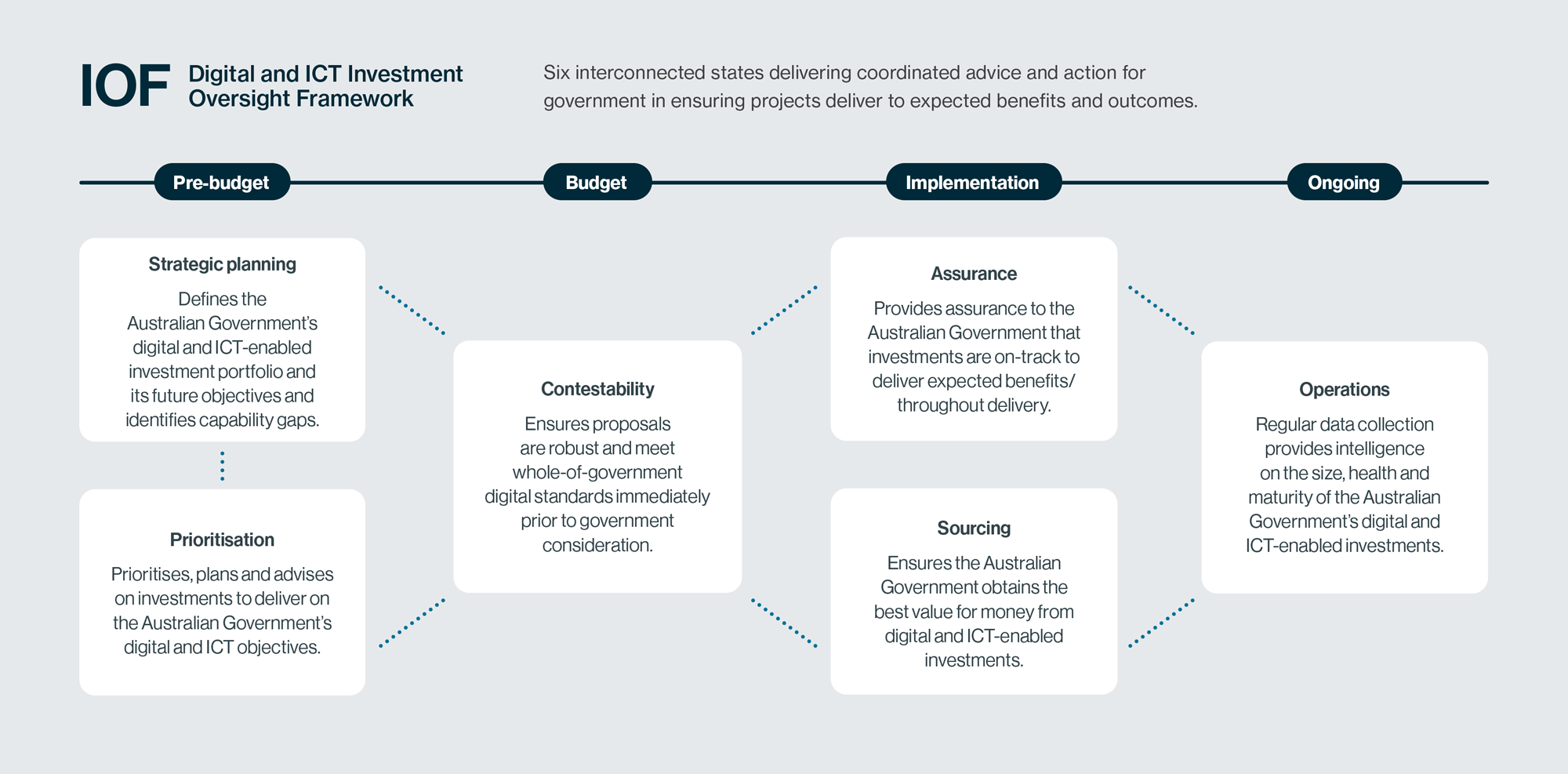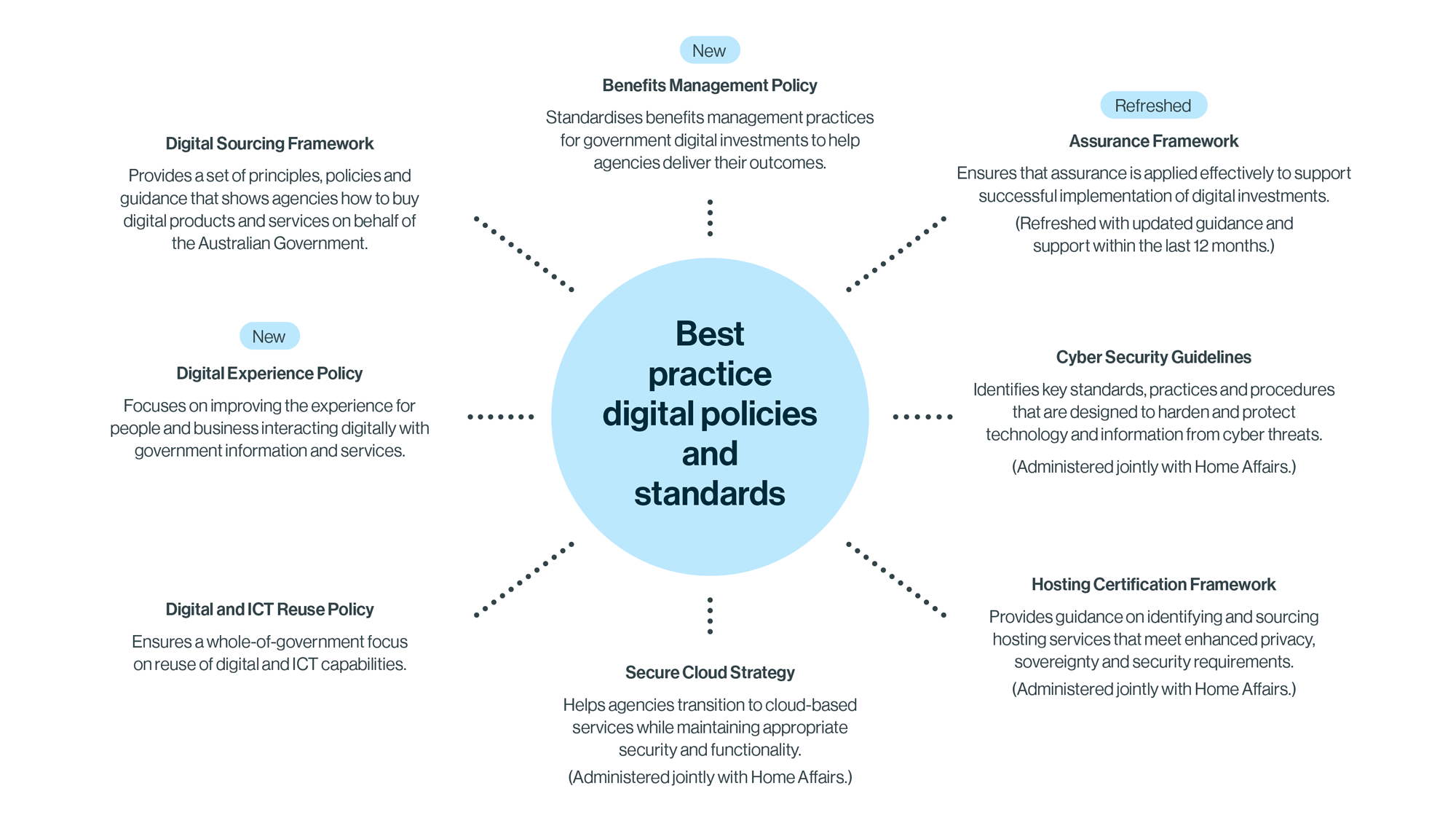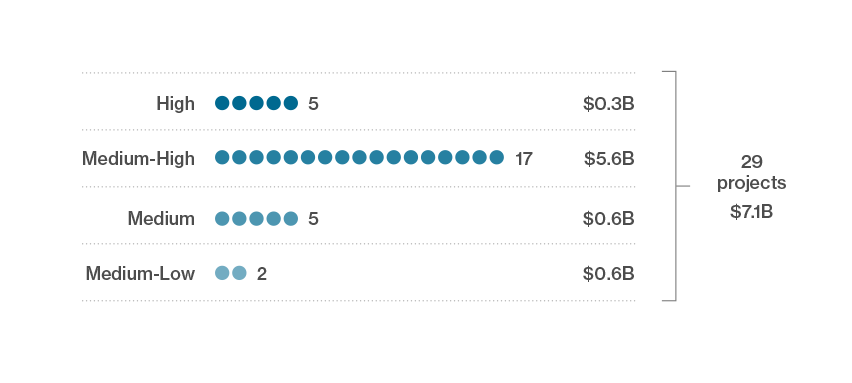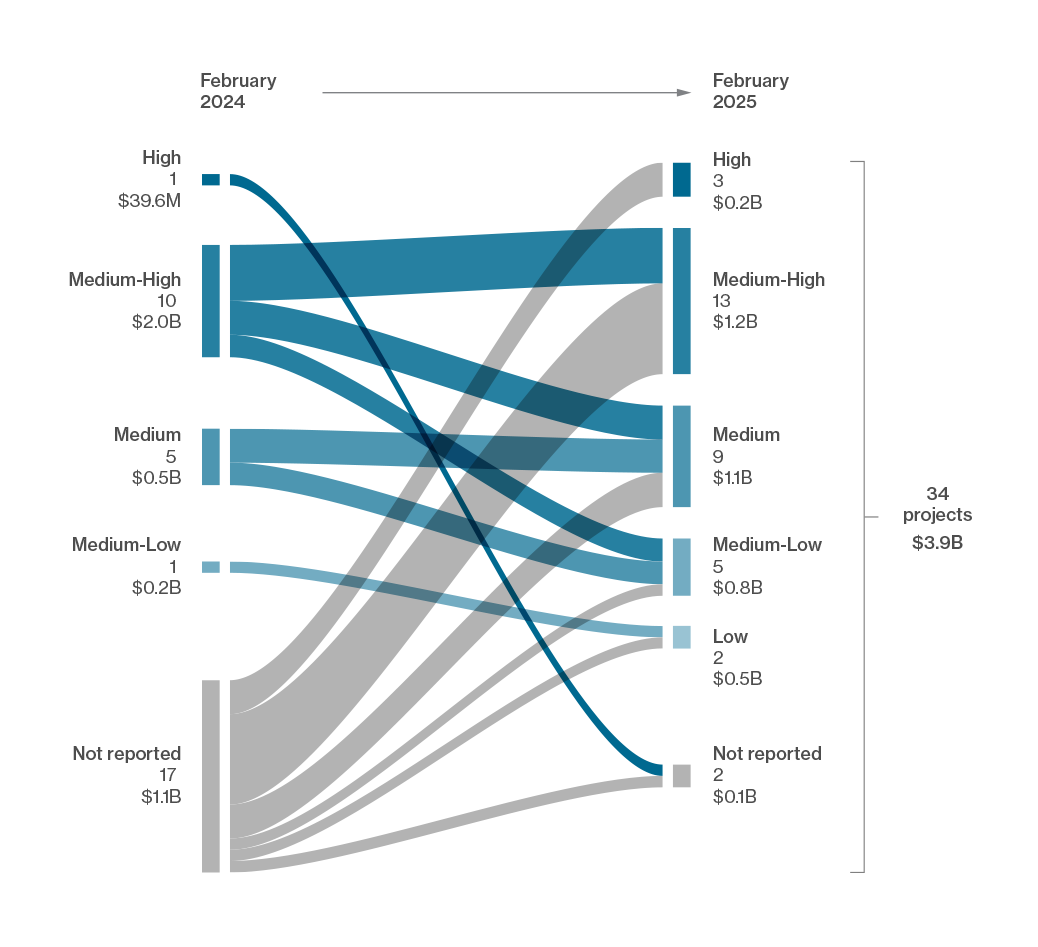How the Australian Government manages its digital projects to support success
This section explains how digital projects are supported from the centre of government including through a world-leading investment management framework specifically designed to create the conditions digital projects need to succeed.
Reforms supporting success
Ensuring digital projects deliver expected benefits for Australians on time and on budget sits at the heart of each of the reforms highlighted throughout this report.
How digital projects are monitored and supported from the centre of government
In the past year, more projects have come under central monitoring and oversight as part of the Australian Government’s Digital and ICT Investment Oversight Framework (IOF).
This world-class framework is designed to ensure digital projects are strategically aligned, carefully prioritised, meet digital policies and standards, and realise expected benefits for Australians.
The IOF starts with setting a clear strategic direction, which is then reinforced throughout the lifecycle of project design, funding and implementation. Throughout this lifecycle, best-practice digital policies and standards set clear requirements with agencies supported to meet these requirements by the DTA.

Image description
IOF Digital and ICT Investment Oversight Framework.
Six interconnected states delivering coordinated advice and action for governmentin ensuring projects deliver to expected benefits and outcomes. The diagram shows four headlines with various states of the IOF below them as subheadings.
- Image headline: Pre-budget
- Subheading: Strategic planning: Defines the Australian Government’s digital and ICT-enabled investment portfolio and its future objectives and identifies capability gaps.
- Subheading: Prioritisation: Prioritises, plans and advises on investments to deliver on the Australian Government’s digital and ICT objectives.
- Image headline: Budget
- Subheading: Contestability: Ensures proposals are robust and meet whole-of-government digital standards immediately prior to government consideration.
- Image headline: Implementation
- Subheading: Assurance: Provides assurance to the Australian Government that investments are on-track to deliver expected benefits/ throughout delivery.
- Subheading: Sourcing: Ensures the Australian Government obtains the best value for money from digital and ICT-enabled investments.
- Image headline: Ongoing
- Subheading: Operations: Regular data collection provides intelligence on the size, health and maturity of the Australian Government’s digital and ICT-enabled investments
Reforms supporting success – enabling project success through good assurance
Since 2021, the Australian Government has invested in strengthening central oversight of digital projects. This central oversight works to ensure best practice is systematically applied as digital projects are designed and delivered across agencies. By driving the adoption of best practice, central oversight plays a key role in giving each digital project the best chance of success.
The Assurance Framework for Digital and ICT Investments mandates global best practice in the use of assurance for digital projects. While assurance doesn’t in itself deliver outcomes, effective assurance is critical to good governance and decision-making. All projects in this report are subject to the Assurance Framework and must apply its ‘key principles for good assurance’. These principles draw on global best practice and, when applied effectively, provide confidence that digital projects will achieve their objectives, without leading to excessive levels of assurance.
The Assurance Framework also includes escalation protocols to support agencies to resolve delivery challenges digital projects might encounter. Central oversight of assurance also ensures that lessons learned from across digital projects are systematically incorporated into the design and delivery of future projects to reduce the risk of delivery issues arising in future.
Reforms supporting success – ensuring digital projects are well designed
The DTA works with agencies to ensure robust and defensible proposals for spending on all new digital projects.
Each proposal must align with the government’s strategies, policies and best practice digital standards as part of the Digital Capability Assessment Process (DCAP).
For complex, high-risk and high-cost digital projects, the DTA offers additional support through the ICT Investment Approval Process (IIAP). This involves working with agencies to develop and mature implementation planning to support success. A comprehensive business case must clearly demonstrate the need for funding, based on thorough policy development, a well-planned approach to delivery and mechanisms for reviewing project progress. This process aids government decision-making on whether to fund large and complex digital project proposals.
The DTA’s digital policies and standards codify best practice and ensure digital projects are positioned to succeed
The policies that apply to digital projects in the Australian Government are constantly being reviewed and updated. This is necessary to ensure they best support agencies in delivering the world-class data and digital capabilities needed to support the missions set out in the Data and Digital Government Strategy.

Image description
The image shows a central circle with lines leading off to the subheadings.
Image headline (in the centre): 'Best Practice Digital Policies and Standards'
Sub headings:
- Secure Cloud Strategy
- Helps agencies transition to cloud-based services while maintaining appropriate security and functionality.
- (Administered jointly with Home Affairs)
- Hosting Certification Framework
- Provides guidance on identifying and sourcing hosting services that meet enhanced privacy, sovereignty and security requirements.
- (Administered jointly with Home Affairs
- Cyber Security Guidelines
- Identifies key standards, practices and procedures that are designed to harden and protect technology and information from cyber threats.
- (Administered jointly with Home Affairs).
- Assurance Framework (Refreshed)
- Ensure that assurance is applied effectively to support successful implementation of digital investments.
- (Refreshed with updated guidance and support within the last 12 months)
- Benefits Management Policy (New)
- Standardises benefit management practices for government digital investments to help agencies deliver their outcomes.
- Digital Sourcing Framework
- Provides a set of principles, policies and guidance that shows agencies how to buy digital products and services on behalf of the Australian Government.
- Digital Experience Policy (New)
- Focuses on improving the experience for people and businesses interacting digitally with government information and services.
- Digital and ICT Reuse Policy
- Ensures a whole of government focus on reuse of digital and ICT capabilities.
Reforms supporting success – improving benefits management capability
The Australian Government’s Benefits Management Policy for Digital and ICT-Enabled Investments requires agencies to use best practice benefits management for their digital projects. Projects must identify measurable benefits with clear baselines and targets before funding decisions are taken. The minimum policy requirements are adjusted based on project tier, but all projects must focus on securing benefits in addition to preventing cost and schedule overruns.
The DTA oversees the realisation of benefits and identifies emerging risks across digital projects. We also focus on providing advice, support and training to improve public service capabilities.
Investment in this area aims to ensure that digital projects deliver anticipated benefits to the government and Australians.
Image description
Diagram headline: 'Total number and budget of projects in each delivery confidence rating category, by Tier 1 and Tier 2'
The diagram demonstrates that Tier 1 projects have:
- No projects with high delivery confidence rating
- 11 projects with Medium-High delivery confidence and a total budget of $1.5 billion
- 5 projects with Medium delivery confidence and a total budget of $1.0 billion
- 2 projects with Medium-Low delivery confidence and a total budget of $0.7 billion
- 2 projects with Low delivery confidence and a total budget of $0.5 billion
- No projects had an Unavailable delivery confidence
Tier 2 projects have:
- 8 projects with High delivery confidence and a total budget of $0.5 billion
- 19 projects with Medium-High delivery confidence and a total budget of $5.3 billion, $3.4 billion of this comprising the Resourcing Australia’s Prosperity (RAP) Initiative project, with the remaining 18 projects comprising $2.0 billion.
- 9 projects with Medium delivery confidence and a total budget of $0.6 billion
- 5 projects with Medium-Low delivery confidence and a total budget of $0.6 billion
- No projects had a Low delivery confidence
- 1 project had an Unavailable delivery confidence with a total budget of $18.9 million.
Changes in delivery confidence
New major digital projects are generally starting off well with more than three-quarters reporting High or Medium-High delivery confidence.
The government’s digital projects are being delivered against a backdrop of rapid and continuous technological change. This dynamic environment is reflected in the changes in delivery confidence ratings over the past year as projects move through different stages in their development.
Delivery confidence of projects which have newly entered central oversight

Case study: Tax and super
Australian Taxation Office: Creating secure data centres
At a glance
- Tax and super
- ato.gov.au
- $369.7 million investment
Summary
The ATO Data Centre Transformation delivered modern, resilient and secure data centres that keep pace with technology, demand and community expectations, while keeping data secure.
The ATO undertook this once-in-a-generation infrastructure and data centre modernisation program to align with government directives and ensure the ongoing security and integrity of critical data stores.
The importance and complexity of the ATO’s role in the Australian economy means it must provide digital experiences and services that make it easy for the community to engage while also safeguarding taxpayer data.
This complex project overcame many challenges. Many data centre migrations of this size and complexity fail, leaving the organisation in a hybrid state with significant technical debt. The success of the ATO data centre program was largely due to the collective drive and commitment to overcome technical issues.
The outcome was to deliver the most significant technology transformation for the ATO in 30 years.
"As the Australian Government’s principal revenue collection agency, data underpins everything we do. Our data stores are growing every year, so keeping our systems safe and protecting the personal information entrusted to us by taxpayers is paramount."
Michael Rowell
ATO Deputy Commissioner and Senior Responsible Official
The outcomes delivered directly contributed to or created business benefits for the ATO and the broader community. These include fewer service interruptions so clients can access ATO services when they need to with greater confidence, as well as reduced national security risk for sensitive data.
Note: This project is not featured in this report as it closed before the start of public reporting in 2024. This project is, however, enabling delivery of current ATO projects and is included as an example for this reason.
OffYour responsibilities
To successfully meet this criterion, you need to:
- develop a business case for change
- survey the policy and service landscape
- understand your service’s life cycle
- adopt an agile methodology
Nearly two thirds of the Tier 1 and 2 projects are on track
| Total projects (Tier 1 and 2) | 62 |
| Number with High or Medium-High delivery confidence | 38 |
| Percentage with High or Medium-High delivery confidence | 61.3% |
| Total budget with High or Medium-High delivery confidence | $7.3 billion |
| Note: High or Medium-High delivery confidence indicates projects are on track to deliver agreed outcomes. | |
Common success factors among projects rated High or Medium-High are:
- experienced staff on the project team
- effective governance models keeping pace with the needs of the project
- mature approaches to risk and issue management
- effective partnering and collaboration between agencies and delivery partners.
Reforms supporting success – preparing senior leaders to lead digital projects successfully
Senior Responsible Officials for digital projects have a key role in ensuring these projects succeed in delivering expected benefits on schedule and on budget. To support these officials, a mandatory program is starting early this year to ensure they are equipped to confidently lead digital projects successfully. This program includes a simulation of a digital project across its life with a focus on building capability in assurance, benefits management, governance, project remediation, and commercial acumen. Following final trials, the program will be available through the Australian Public Service Academy and mandated for all leaders of the major digital projects included in this report.
While most projects are on-track, some projects are reporting lower levels of delivery confidence
| Total projects (Tier 1 and 2) | 62 |
| Number with Medium or Lower delivery confidence | 23 |
| Percentage of total projects with Medium or lower delivery confidence | 37.1% |
| Total budget of projects with Medium or lower delivery confidence | $3.5 billion |
| Tier 1 projects with Medium or lower delivery confidence | 45.0% |
| Tier 2 projects with Medium or lower delivery confidence | 33.3% |
As this table shows, a higher proportion of Tier 1 projects (45.0%) are reporting a delivery confidence of Medium or lower compared with Tier 2 projects (33.3%), likely reflecting the added risks and complexities inherent to these projects.
Common themes among projects rated Medium or lower are:
- dependencies on changes to, or introduction of, new legislation
- the complex nature of the technological solutions being implemented – including where integration of systems across organisations and even jurisdictions is required to achieve outcomes
- where digital transformation is occurring alongside major organisational changes, or at a pace the organisation is struggling to sustain (for example, due to multiple concurrent digital projects putting pressure on an agency’s enterprise capability)
- challenges attracting and retaining staff with the required skills including in digital disciplines such as cyber security, as well as in project/program management disciplines such as benefits, change, risk, budget management and integrated scheduling.
Projects reporting lower levels of delivery confidence are generally challenged by more than one of these themes. As noted in the July 2023 Review of the Modernising Business Registers Program, ‘the difficulty of effectively implementing a digital and ICT transformation project increases exponentially with each additional layer of complexity’ (Treasury 2023 p. 338).
Reforms supporting success – reducing risk through robust assurance and governance
Parallel development of legislation and digital capabilities can lead to significant delivery risks, including budget overruns, delays and, in extreme cases, project failures. Sometimes urgent factors make this concurrent work necessary, but where this occurs the associated risk must be managed carefully.
For high-risk digital projects, robust assurance and governance are crucial. The DTA seeks to mitigate risk by adding central funding and governance controls. An example is recommending the government quarantine part or all project funding, releasing it upon successful early discovery work and other proof points that indicate likely successful delivery.
Some continuing projects are reporting delivery difficulties

Note: One project reporting a high delivery confidence in February 2024 is no longer reported since being reclassified from a Tier 2 to a Tier 3. This project now falls outside the scope for inclusion of delivery confidence information.
Image description
Headline: Some continuing projects are reporting delivery difficulties
Subheading: Change in delivery confidence of projects which were included in the February 2024 report
Sankey chart depicting the flow of delivery confidence ratings for projects continuing under oversight from February 2024, indicating starting delivery confidence ratings, to their delivery confidence ratings in February 2025, with numbers of projects and total budgets ascribed to each delivery confidence category.
High delivery confidence: 1 project with a total budget of $39.6 million had high delivery confidence in February 2024, did not report delivery confidence in February 2025.
Medium-High delivery confidence: 10 projects with a total budget of $2.0 billion had medium-high delivery confidence in February 2024. In February 2025 this stayed at medium-high delivery confidence for 5 of these projects, reduced to medium delivery confidence for 3 of these projects and dropped to medium-low delivery confidence for 2 of these projects.
Medium delivery confidence: 5 projects with a total budget of $0.5 billion had a medium delivery confidence in February 2024. In February 2025 this remained at medium delivery confidence for 3 of these projects, with 2 reducing to medium-low delivery confidence.
Medium-Low delivery confidence: 1 project with a total budget of $0.2 billion had medium-low delivery confidence in February 2024, reducing to low delivery confidence in February 2025.
Not reported delivery confidence: 17 projects with a total budget of $1.1 billion did not report delivery confidence in February 2024. In February 2025, 3 of these projects reported high delivery confidence, 8 reported medium-high, 3 reported medium, 1 reported medium-low, 1 reported low delivery confidence and 1 continued to not report delivery confidence.
In February 2024, 1 project had high delivery confidence, 10 had medium-high delivery confidence, 5 had medium delivery confidence, 1 had medium-low delivery confidence and 17 did not report delivery confidence.
In February 2025, 3 projects had high delivery confidence, 13 had medium-high delivery confidence, 9 had medium delivery confidence, 5 had medium-low delivery confidence, 2 had low delivery confidence and 2 did not report delivery confidence.
OffOf the 17 continuing Tier 1 and 2 projects that reported delivery confidence in February 2024, 11 projects either maintained or dropped in delivery confidence to Medium or lower in February 2025. These projects are routinely managing 3 or more delivery challenges that affected their assessments. Common trends include: financial pressures; scope complexities; resourcing constraints; tight schedules; technical issues; and a need to improve project management maturity.
While the goal is to see DCAs improving over time, it is common for delivery issues to worsen before they improve, especially when complex technical issues are involved. Some projects reporting lower DCAs are depending on the successful delivery of other projects as part of a wider reform program. While they have been closely monitoring delivery, setbacks in other projects can result in these projects being delayed, as key components required to stay on track become unavailable when needed.
Reforms supporting success – using new ways of collecting data to enable timely support and course corrections
In July 2024, the DTA began a Project Data Reporting Standard (PDRS) trial. The trial is testing a new approach to enable more seamless and timely central tracking of project performance across the Australian Government, using ‘natural systems’.
Using ‘natural systems’ means project data is collected from internal reporting projects are preparing for their governance boards, rather than requiring agencies to prepare specific reporting for central tracking purposes.
This approach is:
- improving the quality of reporting and advice the DTA can provide to stakeholders across the Australian Government – including by enabling data to be collected more frequently
- supporting decision-making by ensuring digital governance boards consistently have the minimum necessary information required to enable good decisions (a condition of the trial is that a minimum set of information must be provided to the board)
- improving the experience of agencies providing data to the DTA in our oversight role.
The trial is enabling more timely and effective central oversight of digital projects, helping ensure support can be provided where it needed most and at the earliest stage when the chance of charting a course back to green is greatest.

